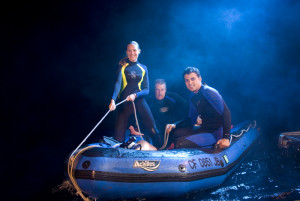Diving Fitness is important to divers. How fit do you need to be to dive? The answer is “it depends.” Diving in colder water with a drysuit and extra weight requires a higher level of fitness than diving in warm, calm water. Does that mean you need to be super fit, zero body fat and ripped muscles? No.
For the most part, most people can dive safely as they are. If you get winded going up a flight of stairs, though, you might want to consider improving your diving fitness before diving. At the very least, you need to be fit enough to do a surface swim, in your scuba kit, back to the shore or boat. Scuba kit definitely adds drag, so you need to be able to overcome that resistance.
Some of the benefits of better diving fitness include:
- Better air consumption, because your body is operating more efficiently.
- Normal diving tasks are easier, such as carrying your tank.
- Using less weight; muscle is denser than fat, so you don’t need to use as much weight.
- Better able to respond to emergency situations.
- Excess weight has been correlated with a higher incidence of decompression sickness. Less body fat may lower your risk.
How do you get fit for scuba? Two essential items are building muscle strength and aerobic capacity. Muscle strength helps with kitting up, kicking in the water and weighting. Aerobic capacity is good for your air consumption and being able to respond to emergency situations. You need both for optimal diving fitness.
Muscle strength can be built with exercises such as weight lifting or resistance training. Divers Alert Network has several great articles on strength training:
Cardiovascular exercise to boost your aerobic capacity needs you to move and get your heart rate up. Biking, walking, running, and swimming are great activities. Thirty-minutes a day, most days of the week is a good goal.
Diet is also important for your overall fitness. Reducing your fat intake, eating more vegetables (without butter and cheese) and limiting your meat intake are good places to start. That doesn’t mean you need to make radical changes in your diet, just think about what your eating and see if you can trim out the fat and make it a bit healthier.
Of course, be sure to consult with your personal physician before taking up an exercise program.
So far, I’ve talked about physical fitness. What about medical fitness? Some medical conditions may keep you from diving. Others may not. The final call is a physician’s, but here are some things to think about:
- You need to be able to equalize any body air spaces as well as any artificial air spaces. Why? As you descend, pressure from the water will compress those air spaces. Failing to equalize body air spaces often results in your body equalizing in other ways, such as ear drum rupture or bleeding. If you are congested or you’re having problems breathing, you may not be able to equalize.
- Many medications have side effects, such as drowsiness. Some of these effects can magnify at depth, or the effects of the medications can wear off (e.g., decongestants) and put you at risk for equalization problems on ascent.
- Various types of surgery and/or other medical conditions can also be of concern.
In the US, student divers need to complete a medical form that determines if they need to be evaluated by a physician. In some countries, every student diver has to be evaluated by a physician. When you complete the medical form, you need to be honest. A “YES” doesn’t necessarily mean you can’t dive (I answer YES to several questions, but I’m cleared to dive), it just means you need to be evaluated by a physician to make sure you’re not at risk for injury.
Being cleared to dive once by a physician or not answering “YES” on the medical doesn’t necessarily mean you’re ready to dive on that day. You need to evaluate yourself to make sure you’re ready for the dive.
- Do you have any congestion?
- Are you taking any medication that is imparing your judgement?
- Have you recently been injured?
- Is your mind on the dive, or are you distracted?
You need to evaluate yourself and make sure you’re ready to dive. Diving fitness starts and ends with you.

